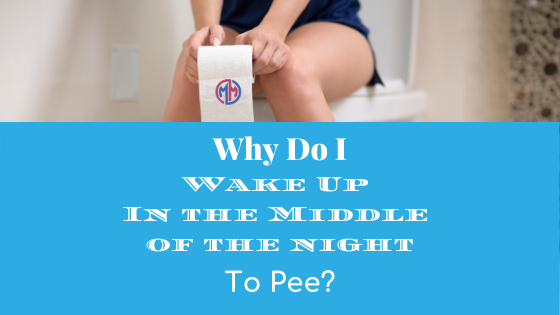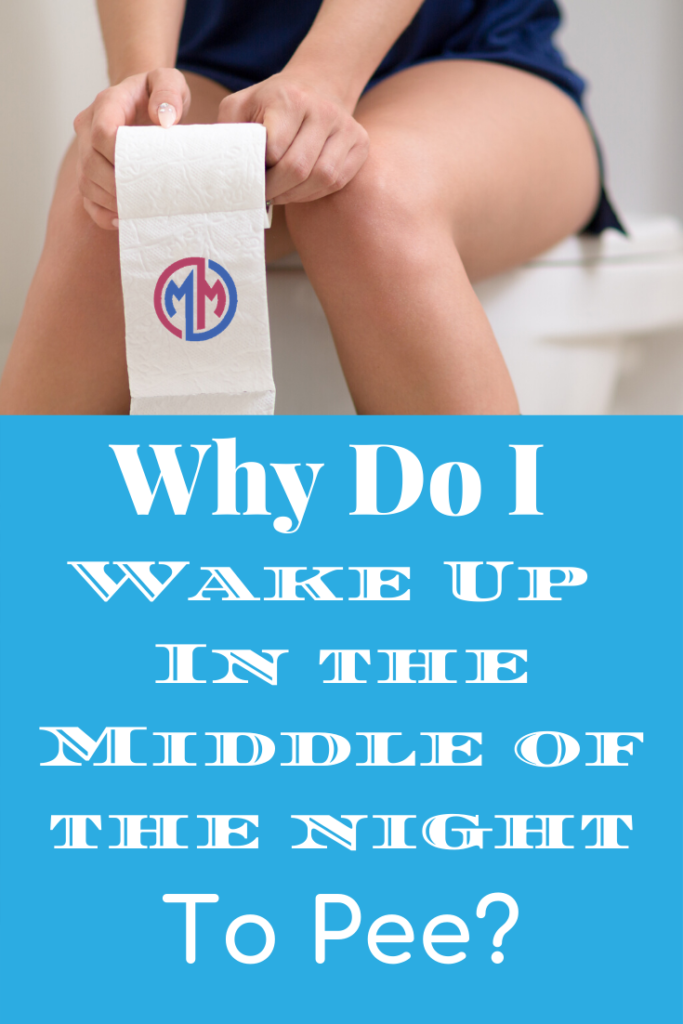
It must be 3:00 am because I’ve gotta pee. Or as I like to call it, My Pee Pee Alarm Clock is going off. It was such as great dream, then all of the sudden bam! I’m awake and have to pee. Why do I wake up at night to pee?
How can I make it stop.
Please make it stop.
Not only does it interrupt my sleep, but then I have trouble going back to sleep. And it’s not always just once, sometimes it’s multiple times a night.
Sleep is one of the pillars of maintaining a healthy lifestyle and we all need good quality sleep.
It’s hard enough to get to bed at a decent time with our current non-stop lifestyles. Throw in a crying baby (not literally), or just a child having a bad dream and our sleep cycles are thrown out of whack. This has a huge impact on our well being and happiness.
When disruptions happen in the midst of a sleep cycle, it interferes with the benefits you were so close to receiving.
If you wake up at night to pee, you may be able to fix it by changing some simple habits. But it also may not be as simple as that, it may be a medical condition.
Is This Normal?
The body being the amazing machine that it is, is designed to produce less urine at night. So most people don’t need to wake up at night to pee. But it gets more common as we get older.
Nocturia
The medical term for excessive urination at night is called nocturia, or nocturnal polyuria. Causes of Nocturia range from simple life style habits to serious medical conditions.
If you wake up two times or more per night to pee you may be considered as having nocturia.
Excessive Fluid Consumption
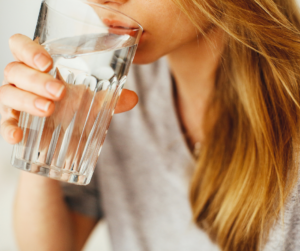
This is probably the most common lifestyle habit that causes us to have to get up in the middle of the night to go to the bathroom.
Try not drinking any alcohol or caffeinated drinks throughout the day. These are considered diuretics and they cause your body to flush (pun intended) fluids out of your body.
You may not have to give them up entirely. Start by giving yourself a cut off time and see if you still wake up in the middle of the night to pee. If this doesn’t work, keep increasing the time between drinking and the time you go to sleep.
Use a diary and start tracking your fluid intake to help you not wake up at night to pee. You may not have to give up drinking alcohol or caffeinated drinks, you may just have to implement a cutoff time.
Try this same technique with other drinks if you think they may be the culprit.
Bladder Irritating Foods
Some foods may irritate your bladder causing you to wake up at night to pee. These foods include:

- Oranges
- Grapefruits
- Lemons
- Limes
- Fruit juices
- Spicy foods
- Tomato based products
- Carbonated drinks
- Chocolate
Try taking these foods out of your diet for 1-2 weeks and see if it helps. If it does, slowly add each one back into your diet one at a time to figure out which one or ones are the culprits.
Medications
If you take medications for high blood pressure, or other conditions they may contain diuretics and this may be your culprit.
Pregnancy
If you’ve ever been pregnant you know that little “peanut” inside is really good at pushing down on your bladder making you have to pea, all the time.
This also may happen at the beginning of pregnancy as well. Could this be your culprit?
Low Fluid Intake
This may sound counter intuitive, but if you don’t drink enough fluids during the day your urine may be concentrated. This may be irritating your bladder causing you to have to pee in the middle of the night.
Age
Unfortunately as we get older we have to urinate more frequently because our bladder muscles get weaker. The bladder walls change and are unable to hold as much urine causing us to wake up at night to pee.
By no means should you accept this as the only reason for having to pee at night. There are other things you can do.
Get working on those kegel exercises. Hold tight…1…2…3…4…5, relax 1…2…3…4…5 and strengthen that bladder!
Also try cutting off the stream mid pee. It may not be as easy as it used to be, but it will help.
Medical Conditions
Hopefully you can solve your problem with changes to your daily eating and drinking habits or kegel exercises. If not you may have a medical condition that’s causing your nocturia.
Urinary Tract and Bladder Infections

Urinary tract infections and bladder infections are common causes of noctura. These infections are usually accompanied by burning sensations and the urgent need to have to pee.
Your Doctor will more than likely prescribe antibiotics for treatment, but if you catch it early you may be able to treat it at home with cranberry juice. I recommend organic with little or no sugar.
Other Medical Conditions
There are a wide variety of medical conditions which may be causing you to wake up at night to pee.
Here are some of those conditions:
- Anxiety
- Kidney infection
- Sleep apnea
- Enlargement of the prostate
- Tumors
- Diabetes
Whatever you do, please don’t start self diagnosing yourself using Dr. Google. If you think you have a medical condition that’s causing you to wake up at night to pee go see your doctor right away.
Help I Can’t Fall Back Asleep
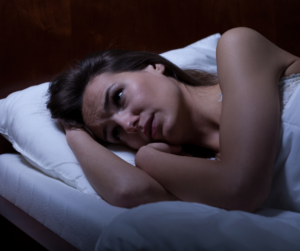
Whatever you do, don’t start looking at your clock. This will wake you up even more. It may even make you stress out about losing sleep and how it’s going to make you feel in the morning.
Now that your bladder is empty try relaxing your whole body starting at your toes. Slowly relax each part of your body as you scan from your toes to the top of your head.
If you still can’t go to sleep and it’s been approximately 20 minutes, get up and leave your bedroom says sleep disorders specialist Harneet Walia, MD, DABM, of Cleveland Clinic. If you keep laying in bed you may start worrying about falling asleep, which may stop you from going back to sleep.
Try doing something that is uninteresting so your brain will get bored and want to go back to sleep.
Listening to relaxing music may also do the trick. But I highly recommend not listening to nature sounds with oceans, waterfalls or rivers.
How Do I Make It Stop?
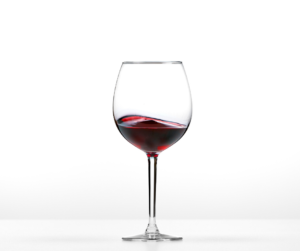
Just Say No
The easiest thing to do is to stop drinking any liquids close to bedtime. Especially drinks containing alcohol, sugar and caffeine. If this doesn’t turn out to be a quick fix, start tracking what, and at what time your drinking these things. Keep backing off the time until you’ve hit the permanent snooze on your pee pee alarm clock.
Exercise
If you’re not doing Kegel exercises you need to start doing them during the day. Kegel exercises strengthen your pelvic floor making the muscles that you use to hold your pee stronger. The stronger the walls, the less pressure you’ll feel on your bladder.
Just follow these four easy steps
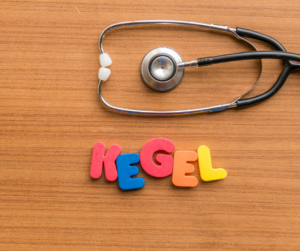
- Make sure your bladder is empty, then sit or lie down
- Tighten your pelvic floor muscles and hold for 3-5 seconds
- Relax the muscles and count for 3-5 seconds
- Repeat a total of 10 times, 3 times a day
I also find it helpful if you practice cutting off your pee mid-stream and then let it go again. Doing this 3 times has been beneficial to me.
Medications
Check with your doctor to see if any of the medications your taking may be the culprit. Even if you’re not taking medications speak to your doctor about this problem it may be caused by a medical condition.
If your doctor blames it on your age, don’t just accept that this is the cause. Make sure you’re exercising (Kegel), cut back on your fluid intake and don’t eat bladder irritation foods.
Throw The Pee Pee Alarm Clock Out The Window
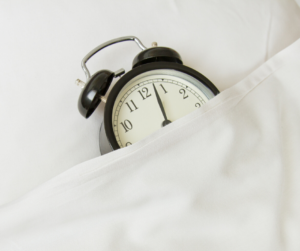
Now that you know what to do to get through the night, give it a shot.
For instance, start with lifestyle changes including giving up or restricting the intake of alcohol and other diuretics. Stop drinking any liquids hours before going to bed. Also check to see if any medications have diuretic effects.
Stop eating those bladder irritating foods.
Get working on those Kegal exercises during the day anywhere you are. No one will notice your clenching 1,2,3,4,5 and relaxing 1,2,3,4,5. Try holding your pee in mid-stream. Go ahead, I challenge you.
Add those kegel exercises to your morning routine
If your pee alarm clock is still waking you up check with your Doctor, you may have something more serious going on.
RESOURCES:
Excessive Urination at Night (Nocturia)
Bladder control: Lifestyle strategies ease problems

